Tragic Subterfuge - The Legend of Zelda: Majora's Mask
A Retrospective

(DISCLAIMER: Mild story spoilers ahead.)
I remember playing the Zelda games (or at least, watching my older siblings play the Zelda games, the greedy, controller-hogging… anyway…) all throughout my childhood. Of the few Zelda titles I was able to play to completion growing up, The Legend of Zelda: Majora’s Mask, is, hands down, one of the most—if not the most—influential games I have ever had the joy and privilege of playing.
If you’re not familiar with the basic story—either through the Nintendo 64, Gamecube or 3DS or even virtual console versions—Link is tasked with stopping the destruction of a world parallel to Hyrule by the name of Termina.
The moon, being on a collision course with Termina—and during a festival, no less—has afforded Link only three days to avert catastrophe. Civilization, life, reality itself, all traces will be erased in an endless cycle of destruction if nothing is done to divert the flow of time toward a brighter future.
Link’s first introduction to the game begins as he travels though an unfamiliar forest astride his horse (Epona), falling off the horse (after she is spooked). Link awakens from his stupor only to be confronted by the titular villain—Majora—who has pilfered Link’s ocarina. A chase ensues as Majora proceeds to steal Epona by force. Link (after holding on for dear life) loses his grip and falls to the ground, following Majora through the woods on foot in an attempt to rescue his friend.
Link finds Majora waiting for him in a clearing who mocks him, telling him that he has “gotten rid” of Epona. To add further insult, after Majora wields a strange curse, Link stares into the water of a nearby stream to see a Deku Scrub staring back at him. Majora laughs at Link coldly as Link screams, horrified at what he has become. Majora mocks Link one last time before he departs.“Now you’ll look that way forever!!” he laughs, the malice dripping from his every word.
Disfigured, saddened and troubled, Link wanders onward and comes across a strange tunnel, which leads him to a mysterious clock tower. Before he can exit or even collect his thoughts, he is greeted by an eccentric merchant.
“You’ve met with a terrible fate, haven’t you…?”
These words, as innocuous as they may seem to the passive observer, can mean quite a great many things to the average gamer, and to myself, they may mean far more than I will ever comprehend…
The themes of this game are many: loss of innocence, loss of self-perception, fear, death, despair, hatred, regret, time, love, courage, resilience, forgiveness… hope.
Such themes are typically found in video games nowadays, however, nothing in the medium since, in my humble opinion, has ever been truly as profound as this game. From the gloomy tone, to the grim circumstances regarding the subject matter and even the music, this game in particular stands out as both distinct as well as timeless in its relevance, a true work of art.
I do apologize for the sudden shift in tone for this review. I realize that some of you may be expecting a more carefree and humorous take (and I do intend to return to such a format), however, due to the somber nature of this game—and my own personal story regarding it—I didn’t feel it would fit the situation well enough nor do the game proper justice (i.e. – If this article depresses you (alot), send me your grievances and you have my solemn word—Scout’s honor!—that I will personally send you a box of tissues, a tub of ice cream and a large, friendly dog and/or cat to keep you company… well… ok, maybe not, I don’t have the money for that kind of stuff, but hey, at least you’ll be introduced to a good game, if you aren’t already, that is… ‘moving on).
“Believe in your strengths… Believe…”
In dealing with grief—much like in the game—one wanders through an unfamiliar “forest” of sorts, haunted by the loss of someone dear to them. They become so invested in their grief that their self perception shifts and they no longer recognize who they once were, losing sight of themselves and “wearing a mask” to hide their insecurities.
With this, one’s thoughts can become distorted, twisted by doubt and self pity, rendering them unable or otherwise unwilling to do what is necessary to succeed in quelling dejection and loneliness.
“Swamp, ocean, mountain, canyon… Hurry… The four who are there… bring them here…”
Perhaps it is through therapy, perhaps through a mentor, philosophy or even sheer force of will alone—for those truly resilient few—but eventually, one is compelled to “believe in their strengths” in order to heal the warped perceptions that they hold of themselves. In doing so, they free themselves from the endless cycle of destruction that takes place in the depths of their psyche, a “dark night of the soul” as it were, a stoic “festival” in the face of despair…
I had played this game for the first time on Nintendo 64, and, at a very dark and turbulent point in my life, I might even go so far as to say that it had a hand in shaping my own personal views on handling grief, hence the title. Having been a recent “transplant”—as my father put it—I had also been the product of a deeply troubled past. I won’t go into explicit detail about what had happened to bring about my going to live from the east coast to the Midwest—about five states away—though I will say, wholeheartedly, that I wouldn’t wish such a thing on my most hated enemy. The end result of this event was the sudden, tragic loss of a revered figure in my life, scars that would seemingly take a lifetime to fully heal, and far more questions than answers…
“Heh, heh… Thanks… You’re nice. Umm… Can I ask… a question? Your friends… What kind of… people are they? I wonder… Do those people… think of you… as a friend?”
In times since, there have been other dark revelations/implications that have come to light, but again, I will spare you any details. Simply put: I wasn’t in a very good place. Were it not for a few dear friends of mine and my family—though, in all honesty, I would sincerely consider those dear friends part of my family—I might very well have “met with a terrible fate” myself by now, all things considered…
“Then listen to me. Please play this song that I am about to perform and remember it well…”
There are many ways grief can hinder one’s journey through life, but of the lessons this game has taught me—though it has taken me a while to fully realize—is that grief, be it over one’s past experiences or self-perception, does not dictate who one will become, “terrible fate” or no.
You are not the sum of your experiences, but of your own will, you need only remove the “mask” of inadequacy to see who you truly are, one only needs to search within themselves…
“Your true face… What kind of… face is it? I wonder… The face under the mask… Is that… your true face?”
It may truly take a lifetime to come to terms with such things, but that’s just it: we all have to face our demons, but we don’t have to face them alone; and we certainly don’t need to wear a “mask” while doing so.
After all, who says you even need to wear a “mask” to beat the “game”…?
Believe in your strengths… Believe.
albums that may be of interest:
Children of Termina – Rozen
Time’s End I & II – Theophany
About the Creator
Mark Trusty
Well, I'm none too sure that I'll be the guy behind the next "great American novel", but I do know one thing...
I can rite gud.
^ ^
write good
^
well
[Damnit.]
(I-I can edit too...)





Comments
There are no comments for this story
Be the first to respond and start the conversation.